Perseverance, energy, adaptability, joy and wisdom. These are all traits we try to supply to all our young adults in the InvisiYouth community, and all perfect descriptors of our newest Spotlight Story Program feature writer, Jasmine Chen. From New Jersey, Jasmine is not your average 28 year old because she’s also a double lung transplant warrior after dealing with RSV. Her chronic illnesses have given her the life experiences to look at the world with such an empathetic and passionate lens. With her eagerness to improve her daily life, Jasmine has advocated not only for her physical health, but also her mental health, empowering others in the benefits of therapy too. We are so excited for you to read Jasmine’s story, and learn her five life lessons that you can easily apply in your daily life too.
My name is Jasmine, I am 28 years old from New Jersey and in July, I will be two years post- double lung transplant. Despite all the challenges of the past two years (and a pandemic to top it off), it was the best decision I ever made, and managing this condition constantly reminds me of what really matters in life: family, friends, and finding purpose.
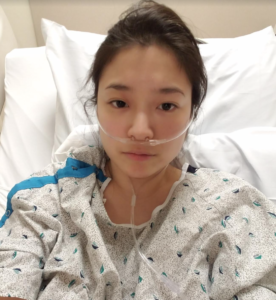 Every year, my birthday would come around, and every year, I would blow on my candles and wish for the same thing: to have healthy lungs. My chronic health journey began when I was three: a doctor’s visit turned into a hospitalization of six weeks; while under the hospital’s care and observation for pneumonia, I caught RSV (Respiratory Syncytial Virus). As a young child, I was much more vulnerable to the virus, and the RSV ravaged through my lungs in a short period of time. Even though I won the battle, the aftermath of permanently scarred lungs turned into an ongoing war. I was a confusing and rare case, and the doctors tentatively diagnosed me with Bronchiolitis Obliterans.
Every year, my birthday would come around, and every year, I would blow on my candles and wish for the same thing: to have healthy lungs. My chronic health journey began when I was three: a doctor’s visit turned into a hospitalization of six weeks; while under the hospital’s care and observation for pneumonia, I caught RSV (Respiratory Syncytial Virus). As a young child, I was much more vulnerable to the virus, and the RSV ravaged through my lungs in a short period of time. Even though I won the battle, the aftermath of permanently scarred lungs turned into an ongoing war. I was a confusing and rare case, and the doctors tentatively diagnosed me with Bronchiolitis Obliterans.
When I entered my double-digit years, I graduated from oxygen dependency around the clock, and began physically attending school part-time. Managing a depleted lung function on top of asthma and a defenseless immune system, my head was always calculating ways to save energy, maximize efficiency, and survive: I would gauge whether the energy spent trekking to my locker outweighed the expense of carrying around a heavy textbook. My normal speed was a slower pace than the average student and I didn’t tend to have the breath to converse, and so I found myself walking alone a lot.
College made it more apparent that invisible illness was both a blessing and a curse. Being able to blend in with the crowd around campus helped because it did not garner any unwanted attention. On the other hand, I found myself often struggling to convince professors, friends, and people in general that I had a disability. A lack of visible proof resulted in many occasions where ignorance fed into a gaslighting culture and my imposter syndrome constantly minimized my suffering.
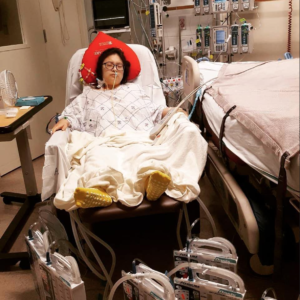 Dealing with society’s ignorance and treatment of my disability is on par, if not arguably worse, then managing the health struggles itself.
Dealing with society’s ignorance and treatment of my disability is on par, if not arguably worse, then managing the health struggles itself.
For example, there were times I had to choose between my health and grades when a college professor refused to allow me to miss the final exam when I was ill. There was the time HR called me in because an anonymous coworker reported me for “abusing” my handicap spot. Did I feel anger, resentment, and frustration when these situations happened? Absolutely. Accepting that these things will happen and learning not to get stuck in it is a lifelong challenge.
Here are some of the things I would tell my younger self if I could:
#1: Learn to self-advocate. Over time, I learned to make my thoughts and concerns louder, whether that was dealing with coworkers, nurses and doctors, or insurance. I used to believe the right way to be humble was by obediently following directions, and trusting those in charge, but eventually I realized it was important to be assertive and vocal while also doing your own research and thinking for yourself: it is possible to both retain humility and make your voice heard.
#2: Be gentle with yourself. You are more resilient than you think. People with chronic illnesses tend to experience the best and worst of life. Sometimes life throws curveballs at you, and many things are simply out of your control. You will meet some unfriendly people, face complicated health issues, and have bad days. But you will also meet some amazing human beings, overcome those challenges, and have great days.
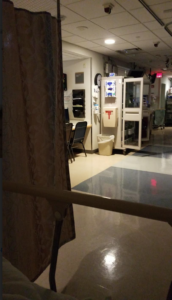 #3: Do not be afraid to seek help. Therapy is a lot like dating: when you meet the right one, it can be cathartic and life-changing. I built up the courage to overcome the stigma of therapy and sorted through several therapists before I found the right one. I began therapy during a dark period in college where I felt isolated, lost, and seriously wondered what the point of carrying on was. These sessions not only helped me navigate through the mental roller coaster of pre- and post- lung transplant, but also forced me to confront my own self-doubts and fears, ultimately empowering me to find and create the life I envision for myself (this will always be a work-in-progress).
#3: Do not be afraid to seek help. Therapy is a lot like dating: when you meet the right one, it can be cathartic and life-changing. I built up the courage to overcome the stigma of therapy and sorted through several therapists before I found the right one. I began therapy during a dark period in college where I felt isolated, lost, and seriously wondered what the point of carrying on was. These sessions not only helped me navigate through the mental roller coaster of pre- and post- lung transplant, but also forced me to confront my own self-doubts and fears, ultimately empowering me to find and create the life I envision for myself (this will always be a work-in-progress).
#4: They are not a reflection of your self-worth. The level of your academics, the number of friends you have, and the experiences you may be deprived of are not your fault. You will meet various unique hurdles in life, whether they be people or circumstances. The amount of classes I missed, especially during the winter, was reflected in my grades. There were friendships that died instantly or faded over time, whether they be because of betrayal, rejection, ignorance, or isolation.
Over time, this perpetuated a greater reluctance to disclose my health condition, for fear people would keep their distance once they knew. But none of these difficult relationships or experiences define who you are or what your value is as a human being.
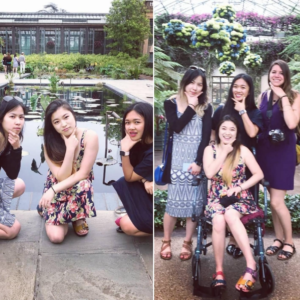 #5: You are the author, director, and CEO of your own identity. “She doesn’t like to mix negative and positive energy…” This is a quote from one of my favorite movies, 50/50 (one of the few realistic movies that does not feed into an “inspiration porn” portrayal of illness). Adam explains to his friend Kyle that his girlfriend has trouble dealing with the fact that he has cancer and refuses to mix her normal, able-bodied lifestyle (“positive energy”) with the “negative energy” of the hospital, which was a culmination of Adam’s illness and pain. For the longest time, I avoided using my handicap sign because I denied that I needed it.
#5: You are the author, director, and CEO of your own identity. “She doesn’t like to mix negative and positive energy…” This is a quote from one of my favorite movies, 50/50 (one of the few realistic movies that does not feed into an “inspiration porn” portrayal of illness). Adam explains to his friend Kyle that his girlfriend has trouble dealing with the fact that he has cancer and refuses to mix her normal, able-bodied lifestyle (“positive energy”) with the “negative energy” of the hospital, which was a culmination of Adam’s illness and pain. For the longest time, I avoided using my handicap sign because I denied that I needed it.
I wanted one insignificant part of my life roaming the parking lots to be separate from my chronic illness life: instead, I gave myself the unnecessary burden of trying to live two identities. But the truth is, I don’t have to choose between me who is ill and the parts of me that aren’t. I am both. I am just me: You are the only one who gets to define who you are.
After some post-transplant complications, today I am at roughly 75% lung function as opposed to 16%. I take a plethora of pills on a daily schedule, I get my blood drawn regularly, I converse frequently with my doctors and undergo whatever procedures are required, I have “moon-face” from steroids- occasionally, I argue with insurance.
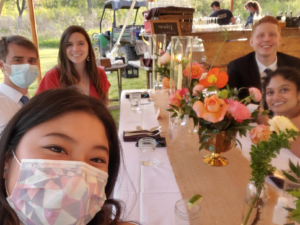 But I am reborn in some sense, experiencing everything with new lungs and lung capacity I never had before. I’ve learned to meditate and savor moments like when I’m safely at home, appreciating the silence and the privacy of my room- things I do not have when hospitalized.
But I am reborn in some sense, experiencing everything with new lungs and lung capacity I never had before. I’ve learned to meditate and savor moments like when I’m safely at home, appreciating the silence and the privacy of my room- things I do not have when hospitalized.
Everything I’ve gone through has grown greater my empathy: “I see the hidden pain in others’ eyes because I recognize it so clearly in my own.”- Melinda Means.
My first time hiking up three miles, first time walking up and down the stairs more than twice a day, and more recently, the first time dancing for a couple hours at one of my best friend’s weddings. Looking forward to many more first times.
